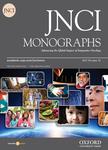版权所有:内蒙古大学图书馆 技术提供:维普资讯• 智图
内蒙古自治区呼和浩特市赛罕区大学西街235号 邮编: 010021

作者机构:Division of Cancer Prevention and Control Centers for Disease Control and Prevention Atlanta GA United States Healthcare Delivery Research Program National Cancer Institute Bethesda MD United States Division of STD Prevention Centers for Disease Control and Prevention Atlanta GA United States Health Transformation & Network Management Blue Shield of California Oakland CA United States Health Policy and Administration Division The School of Public Health University of Illinois Chicago Chicago IL United States Department of Health Service Research Management and Policy University of Florida Gainesville FL United States HealthPartners Institute Minneapolis MN United States Department of Economics Georgia State University Atlanta GA United States Department of Economics Cornell University Ithaca NY United States
出 版 物:《Journal of the National Cancer Institute - Monographs》 (J. Natl. Cancer Inst. Monogr.)
年 卷 期:2022年第2022卷第59期
页 面:28-41页
摘 要:In the past 2 decades, the demand for information on health economics research to guide health care decision making has substantially increased. Studies have provided evidence that eliminating or reducing tobacco use;eating a healthy diet, including fruit and vegetables;being physically active;reducing alcohol consumption;avoiding ultraviolet radiation;and minimizing exposure to environmental and occupational carcinogenic agents should substantially reduce cancer incidence in the population. The benefits of these primary prevention measures in reducing cancer incidence are not instantaneous. Therefore, health economics research has an important role to play in providing credible information to decision makers on the health and economic benefits of primary prevention. This article provides an overview of health economics research related to primary prevention of cancer. We addressed the following questions: 1) What are the gaps and unmet needs for performing health economics research focused on primary prevention of cancer? 2) What are the challenges and opportunities to conducting health economics research to evaluate primary prevention of cancer? and 3) What are the future directions for enhancing health economics research on primary prevention of cancer? Modeling primary prevention of cancer is often difficult given data limitations, long delays before the policy or intervention is effective, possible unintended effects of the policy or intervention, and the necessity of outside expertise to understand key inputs or outputs to the modeling. Despite these challenges, health economics research has an important role to play in providing credible information to decision makers on the health and economic benefits of primary prevention of cancer. © 2022 Published by Oxford University Press.